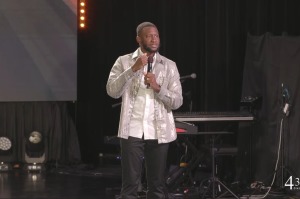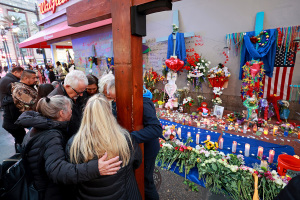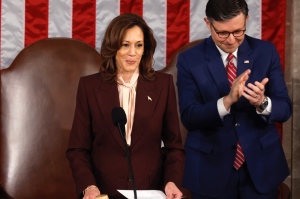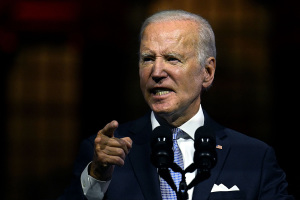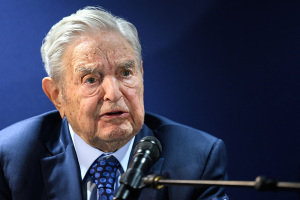HIV/Aids: Clergymen's Response to Stigmatisation
African religious leaders met recently in Abuja, Nigeria to discuss, among other things, the possible ways of stemming the rising wave of HIV/AIDS in the continent.
Surprisingly, since the HIV/AIDS epidemic began ravaging Africa, religious leaders have not taken concrete action or step at contributing to the management and reduction of the disease in the continent.
Those who have questioned the role of religious leaders in the emerging humanitarian crisis like the HIV/AIDS are of the view that the scourge is first closely associated to immoral behaviours. They noted that religious leaders are the custodians of moral values.
However, a large number of African religious leaders under the auspices of World Conference on Religion and Peace (WCRP), last week took a step towards confronting the greatest challenges facing the continent.
The conference is the largest international coalition of representatives from the world's religions who are dedicated to achieving peace. Respecting cultural differences, while celebrating common humanity, WCRP is active on every continent and in some of the most troubled spots on earth, creating multi-religious partnerships that mobilise the moral and social resources of the people to address their shared problems.
Thus, the senior religious figures from across Africa who gathered at the inaugural meeting were unanimous in the aim to map out plans on how they can wield greater influence in their ministries and governments in providing care and support for people affected with HIV/AIDS, especially children.
Right from the time AIDS was recognised in 1981 among homosexuals in the USA, with the virus, Human Immuno-deficiency Virus (HIV) itself identified in 1983, human history has changed drastically from that of hope to fear.
The first reported case of HIV/AIDS in Nigeria was in Lagos in 1986. It was a female prostitute of Ghanaian extraction, working in the Ivory Coast. The disease has since taken an epidemic trend. There has been consistent increase in HIV prevalence rates from 1.8 per cent in 1993 to 3.8 per cent in 1994. From 4.5 per cent in 1996 to 5.4 per cent in 1999. The prevalent rate in 2001 was put at 5.8 per cent.
Thus, the meeting was more than timely given the fact that the issue of HIV/AIDS has over the past decades defied both scientific and natural solutions. The sub-Saharan African has been ranked to be more affected and inflicted by the HIV/AIDS scourge with million deaths and many people daily contacting the diseases.
The importance of the meeting no doubt underscored the participation of the United Nations Children Fund (UNICEF); an arm of the United Nations saddled with the responsibilities of catering for children and women. It is expected that through a forum like this, faith-based organisations through their doctrines and other religious activities would be able to reach out to their numerous faithfuls to bring about behavioural changes and in the process stem the rising trend of HIV/AIDS in sub-Saharan Africa.
Thus, rather than focus on material wealth, such meeting is no doubt necessary as it would force religious leaders to now focus on enlightening members on areas of support for sufferers. A particular area is the need to use their faith to eliminate attendant social stigma, discrimination and other form of social menace facing sufferers across the continent.
"The role and contribution of religious organisations, particularly at family and community levels is key to ensuring that AIDS-affected children are not subjected to stigma, discrimination and exclusion, and that they grow up in a loving, protective and caring family-like environment", UNICEF Executive Director Carol Bellamy said in her message to the participants.
"UNICEF is honoured for the opportunity to join this important assembly because it will help advance the cause that unites us all in building a world fit for children by putting an end to HIV/AIDS, and putting an end to the toll that it is taking on children", she further stressed.
She appealed to the religious leaders to help save a generation of children whose lives are being decimated by epidemic.
"To successfully beat back HIV/AIDS, action is required on the ground, in families and in communities, and no one is better placed to do this than faith-based organisations.
"You have trusted personal relationships and the confidence of the people you serve. You have moral authority. And you are on the frontlines of this devastating epidemic", she further stressed.
The conference was further aimed at galvanising leaders into meeting the moral, social and political challenges HIV/AIDS has brought into each of their communities.
A follow-up from a similar meeting last year in Nairobi tagged "Religious Leaders Assembly on Children and HIV/AIDS", the Abuja conference was expected to also address other issues of relevance for the African continent including conflict, human rights, governance and poverty.
But why the meeting? Speaking on similar issue recently, the Chairman, National Action Committee on HIV/AIDS, Professor Babatunde Osotinmehin, expressed concern over the rising wave of the disease in Nigeria. He disclosed that his committee was marshalling out strategies to curtail the scourge by reaching out to faith-based organisations and community leaders.
A statement from UNICEF office in Nigeria also said that sub-Saharan Africa is the hardest hit region in the world. With just eleven per cent of the global population, the region is home to three-quarters of people living with HIV/AIDS, and eleven per cent of the 14 million children under the age of 15 have been orphaned by the disease.
The agency also stressed that majority of new infections occur among young people aged between15 to 24, especially among girls. In the four most-affected countries, namely Ethiopia and South Africa, more than a third of young women in the same age group are HIV-positive. Nine out of ten children living with HIV/AIDS are said to be African.
Thus, explaining the rationale behind the meeting, UNICEF said: "Faith-based organisations are doing some of the most heroic works at community level in caring for people whose lives have been transformed by HIV/AIDS.
"They provide critical care to the sick and dying, and speak for people whose voices are lost to the stigma and discrimination that so often accompanies HIV/AIDS. They are taking an increasingly prominent and active role in the fight against HIV/AIDS, for children in particular.
"But more can and must be done. Your colleagues are found in every city, town, village and rural districts on the continent. You can spread the word about what it takes to confront and beat this terrible disease through your mosques, temples and churches, through your lay people and your women's groups and youth organisations. The bottom line is that you have a unique power within your organisations, which, if mobilised, could change the face of this epidemic", Bellamy further charged.
She said the various UNICEF country offices have worked with faith-based organisations in several African countries to counter discrimination and meet the needs of children who have been orphaned or made vulnerable by HIV/AIDS.
In Zambia, for instance, UNICEF said it works with the Salvation Army Church to support orphans by providing psychosocial support, conducting home visits and providing basic education. Also in Ethiopia, it helped convened a national religious AIDS week, by bringing together orthodox, muslim and protestant leaders who promised to influence their followers to fight stigma and discrimination of people living with HIV/AIDS.
In Swaziland, UNICEF has also engaged religious leaders in a national campaign to raise awareness of their obligations towards children in the fight against HIV/AIDS, with a special emphasis on stopping sexual abuse.
It was not surprising therefore that in a joint action on HIV/AIDS, both the UNICEF and WCRP expressed commitment to strengthen partnerships with faith-based organisations that have a tremendous capacity to respond to the growing HIV/AIDS crisis.
Jim Cairns, WCRP's director for children's programmes, said: "Africa's religious communities have tremendous reach and capacity to respond to the impact of HIV/AIDS on children. If we don't act now we will lose this generation of children to an entirely preventable disease".
A cheering news however, was that both UNICEF and WCRP have been collaborating in six countries including Kenya, Malawi, Mozambique, Namibia, Swaziland and Uganda to document the role of religious organisations in responding to the needs of orphans and vulnerable children impacted by HIV/AIDS.
The initiative aims to identify responses that can be models for replication. Kenya is said to have already begun implementing recommendations from the study. UNICEF and WCRP are also producing information and action kits for religious leaders to help them in their efforts to alleviate the human misery caused by HIV/AIDS. It is expected that Nigeria will follow suit as follow-up to this meeting of religious leaders, which the country hosted.
Already, to further reduce the rate of transmission from mother-to-child, UNICEF has introduced a pilot project in Nigeria tagged "Prevention of Mother-to-Child Transmission (PMTCT) of HIV". The project was launched by Mrs. Stella Obasanjo, and is expected to take care of the estimated 600,000 children who are infected with HIV worldwide every year.
"Ninety per cent of these children live in sub-Saharan Africa. Without intervention, about one third of HIV-positive mothers transmit the virus to their babies, half of these during breast-feeding," the UN agency disclosed.
It explained that over the years some effective intervention procedures have been developed to prevent transmission of HIV from infected mothers to their babies. The procedures include voluntary counseling and testing, safe delivery, application of anti-retroviral drugs at delivery for mother and child, and appropriate infant feeding.
UNICEF said that these interventions were to be made available through the PMTCT programme in eight pilot sites throughout the country, "six of which are supported by UNICEF".
With this, it is expected that the meeting of the religious leaders would at the long run help channel some messages to various faithful that converge in many of these activities daily to begin to include in their preaching the issue of HIV/AIDS, particularly as regards social stigma and discrimination to sufferers, among others.
















